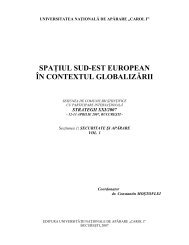PROVOCĂRI LA ADRESA SECURITĂŢII ŞI STRATEGIEI LA ÎNCEPUTUL SECOLULUI XXI
provocări la adresa securităţii şi strategiei la începutul secolului xxi
provocări la adresa securităţii şi strategiei la începutul secolului xxi
Create successful ePaper yourself
Turn your PDF publications into a flip-book with our unique Google optimized e-Paper software.
For the first time, such an important document as the National<br />
Security Strategy, stated that the role of Polish Armed Forces is not only<br />
related to the assurance of the security of Poland, or to the execution of the<br />
Alliance commitments, but also to the protection of Polish interests and the<br />
enhancement Polish position in the international arena. It is completely new<br />
way of the perception of the role of Armed Forces and their place in the<br />
state security policy. That change will bring far-reaching consequences. The<br />
importance of the Poland’s position in NATO, and soon in EU, will depend<br />
in high degree on our efforts and potential that we will contribute to the<br />
above structures. The size, organisation and assets of the armed forces will<br />
be continually adapted to the defence requirements, allied and international<br />
commitments and the social-economic potential of the State. Polish Armed<br />
Forces participate in consolidation of the international order by sharing<br />
military stabilisation operations, mainly as part of the United Nations,<br />
OCSE, and NATO, as well as ad hoc coalitions. They have the obligation to<br />
prepare and maintain an expeditionary force capability for crisis-response<br />
and peacekeeping operations, both in and out of Poland.<br />
The essence of the new type threats is that their origins often reside<br />
in geographically remote places. However, these threats can materialise on<br />
the territory of our country and spread abroad in uncontrolled pattern.<br />
Assuring the citizens security and protection of the national property and<br />
borders, increasingly comes within the remit of institutions and services<br />
acting in the sphere of internal security of the State.<br />
For this reason, the internal aspect of the State security grows in<br />
significance. The tasks of the State institutions within this sphere include:<br />
strengthening of the public order and the institutions that enforce it;<br />
measures against common and organised crime so as to improve the<br />
citizens’ sense of security; protection of the population against the threats<br />
and consequences of natural disasters, ecological catastrophes and<br />
biohazards such as unidentified and incurable disease epidemics; assurance<br />
of the efficient and effective protection of the State borders in compliance<br />
with international regulations, especially arising from our membership in the<br />
EU.<br />
The tasks related to the assurance of the internal security of Poland<br />
is also realised by special services, including intelligence and<br />
counterintelligence. The Police will execute the basic tasks, ensuring<br />
security of the citizens. The critical infrastructure, including<br />
telecommunication infrastructure, should be protected in particular. Fighting<br />
the threats posed to the government information systems and networks is<br />
within the area of responsibility of specialised units established by the<br />
civilian and military services of the State.<br />
Poland might face a rising challenge of mass migrations from poor<br />
and underdeveloped countries, population flows that are increasingly<br />
precipitated by conflicts, political repression, the “failed states”<br />
phenomenon and environmental devastation. The mounting “migration<br />
pressures” will add the fuel to the process of the illegal smuggling and<br />
trafficking of people. Prevention of these tendencies is especially important<br />
in the light of the Polish integration with EU, as the protection of our<br />
borders will be the protection of EU borders at the same time. These are the<br />
main tasks of the Border Guard.<br />
The Security Strategy shows, that to be effective, it must be assured<br />
a strong social-economic backup. A healthy economy is currently one of the<br />
basic guarantees of the national security. The democratic stability and<br />
security of the State must rest on firm economic and civilisational backup<br />
which, on the one hand, condition of the provision of resources for the<br />
security policy in its external aspect and, on the other hand, generate the<br />
necessary components of the State’s stability, national identity and<br />
civilisational vitality, and they constitute the premises for its international<br />
position as a desirable ally and partner.<br />
The indispensable level and stability of expenditures on the<br />
national security has to be assured. The financial aspects of the national<br />
security require that the public authorities pursue a policy of enduring<br />
economic growth, adaptation and streamlining of legal regulations to<br />
strengthen the public finance discipline and effective use of public funds.<br />
State authorities have to develop the right regulatory regime for the money<br />
flows in foreign trade and the disclosure of funds coming from crime. A<br />
stable economic growth and technological progress are among the key<br />
factors of assuring the security of the State in general, and they represent<br />
indispensable components of the national defence capability. Activities<br />
conducted in order to maintain Polish infrastructure at the proper level are<br />
one of the conditions to ensure an adequate defence capability. In the<br />
coming years, the State will have to step up its efforts to modernise the<br />
transport infrastructure, including: the construction of roads and highways,<br />
sustainable development of the railway transport, construction of airports<br />
and airfields as well as of the navigation system, changes in the structure<br />
and volume of cargo handling in the sea and inland shipping, the land-sea<br />
transport and logistics flows.<br />
The education of the society is an essential condition of a<br />
democratic stability and enduring security of the State in a world<br />
characterised by accelerated processes of modernisation and globalisation.<br />
The State will provide conditions for improvement of the general and<br />
specialist education for the Polish society to ensure our contribution and a<br />
55<br />
56




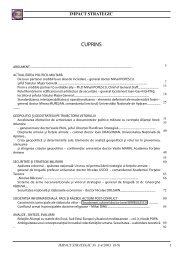
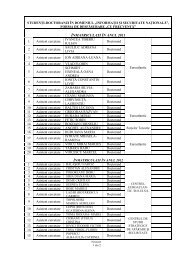
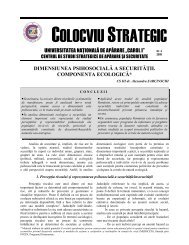
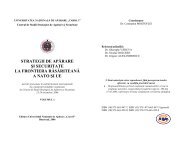
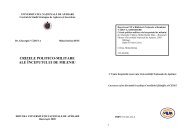
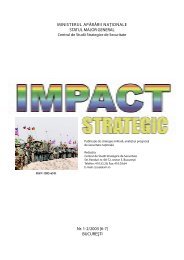


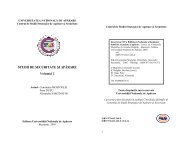
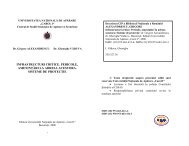
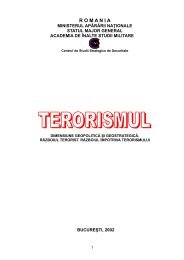

![„CAROL Nr 4 [29]/2008](https://img.yumpu.com/53801719/1/184x260/carol-nr-4-29-2008.jpg?quality=85)
